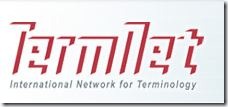What is happening or not happening on the North American market? And what do people in the content supply chain identify as the biggest communication problem? With a focus on terminology, of course. These are the goals, among others, of a survey commissioned by the International Network of Terminology (TermNet).
The survey targets communication professionals, such as translators, terminologists, content publishers, branding and marketing experts on the one hand side and project managers as well as decision makers on the other. They can be located anywhere along the content supply chain—in a company, at a language service provider or on the freelance market. But they should be working in or for the North American market. The survey is focused on several different industries, but not limited to the ones called out specifically.
or those who are not familiar with TermNet, it “is an international co-operation forum for companies, universities, institutions and associations who engage in the further development of the global terminology market. TermNet was founded on the initiative of UNESCO, with the aim to establish a network for co-operation in the field of terminology. In 1988, TermNet was registered as a non-profit organization being allowed commercial activities for the benefit of its members.”
lease participate in the survey and invite all your colleagues and managers! It should take no more than 15 min. You can opt in at the end to receive results and participate in a prize drawing. Click on the TermNet logo to begin.
Thank you very much!

 Throughout the history, any language has always incorporated foreign words and phrases, to paraphrase Darwin, this was the development and “origin of languages by natural selection”. These days, most new words are English, predominantly American English to be precise. All historical attempts to “purify” a particular language proved largely unsuccessful, and many people, including linguists, doubt seriously that such efforts would fare any better today. English has already invaded the languages of Molière, Cervantes and Goethe, dominating above all the fields of technology and business, and spreading widely with the young generations and their jargon. Denglisch, Franglais, Spanglish, Swenglist, Slogleščina and the like were born, a natural linguistic blend of two languages bringing together their morphological, syntactical and phonetic peculiarities in one sentence, often in a single word as well. It occurs mostly in sports, computing, and business where the domestic language, for some reason or the other, lacks words for some concepts, like the word “serve” in tennis, or the domestic word is less well known, e.g. “stock options”. It also occurs when a word is to be “modernized”, shortened or otherwise updated, like “outsourcing” in business, where people go to the “office”, attend “meetings”, work in “teams”, participate in “workshops” and consider “stock markets” in a number of languages. In Slovene, for example, the situation is even more complex because it is a highly inflected language (a single verb, noun, adjective has a vast number of different endings as a rule) and has an almost “phonetic” writing, so we may encounter doublets like tagirati / tegirati (to tag), tagiranje / tegiranje and the shorter version taganje / teganje (tagging) or verbs like surfati, torrentati (mind the double r, which is not a Slovene feature), printati, downloadati (w is not Slovene), keširanje (I am sure you can understand them, I should help you perhaps with the last one – caching).
Throughout the history, any language has always incorporated foreign words and phrases, to paraphrase Darwin, this was the development and “origin of languages by natural selection”. These days, most new words are English, predominantly American English to be precise. All historical attempts to “purify” a particular language proved largely unsuccessful, and many people, including linguists, doubt seriously that such efforts would fare any better today. English has already invaded the languages of Molière, Cervantes and Goethe, dominating above all the fields of technology and business, and spreading widely with the young generations and their jargon. Denglisch, Franglais, Spanglish, Swenglist, Slogleščina and the like were born, a natural linguistic blend of two languages bringing together their morphological, syntactical and phonetic peculiarities in one sentence, often in a single word as well. It occurs mostly in sports, computing, and business where the domestic language, for some reason or the other, lacks words for some concepts, like the word “serve” in tennis, or the domestic word is less well known, e.g. “stock options”. It also occurs when a word is to be “modernized”, shortened or otherwise updated, like “outsourcing” in business, where people go to the “office”, attend “meetings”, work in “teams”, participate in “workshops” and consider “stock markets” in a number of languages. In Slovene, for example, the situation is even more complex because it is a highly inflected language (a single verb, noun, adjective has a vast number of different endings as a rule) and has an almost “phonetic” writing, so we may encounter doublets like tagirati / tegirati (to tag), tagiranje / tegiranje and the shorter version taganje / teganje (tagging) or verbs like surfati, torrentati (mind the double r, which is not a Slovene feature), printati, downloadati (w is not Slovene), keširanje (I am sure you can understand them, I should help you perhaps with the last one – caching).